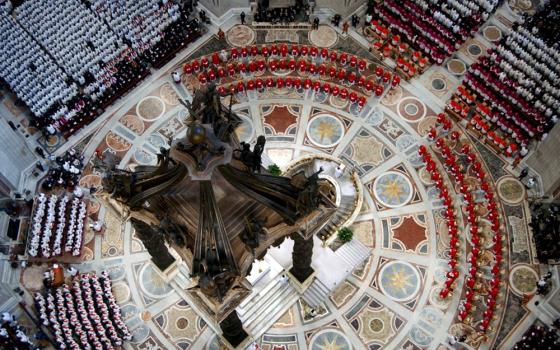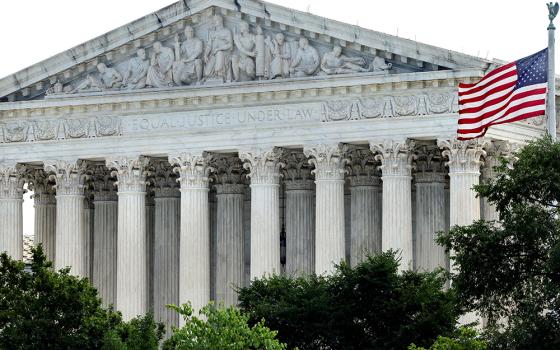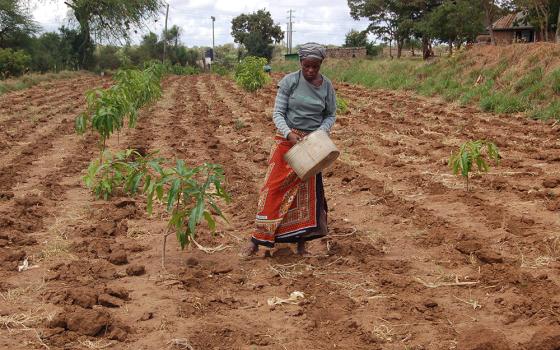Irish Columban missionary Fr. Sean McDonagh sends this report:
"It was snowing heavily this morning when I left the Franciscan house in Roskilde, a town about 45 minutes by train from Copenhagen. I was hoping and praying that we would not have to queue for two hours today before getting into the Bella Center, where the climate change conference is being held. My daily routine begins with a train journey into the centre of Copenhagen, where I then catch the metro to the Bella Center. As I boarded the Metro, an announcement over the public address system told us that the Metro at the Bella Center had been closed because of crowd density. They advised those heading for the Bella Center to get off the Metro at the station before the Bella Center and walk the rest of the way. On hearing that my heart sunk to my boots, and I seriously considered going back to the center of Copenhagen where the non-governmental organization (NGO) events were being held.
I decided to check out the situation first before making any decision. To my surprise the queue was almost non-existent. The police and army had set up outer check points where accreditation badges and also the white cards were verified before allowing people to proceed to the Bella Center. I notice that each day the army and police presence is increasing. Today there were more soldiers and police and a lot of crowd control barriers had been erected in the vicinity of the Bella Center. Heaven knows what will happen on Thursday and Friday when the heads of state turn up.
From the point of view of the organizers the new system is working. It has meant a significant reduction in the number of people in the Bella Center. It is easy to understand why the civil society organizations are as angry as hell with the restrictions. For example, over 700 people were accredited to COP 15 through Brazilian environmental organizations. Quite a number of them are indigenous people from the Amazon. This is the first time they have ever travelled outside their own area, and now they cannot get access to a conference which will decide whether their children and grandchildren have any future. Climate Action International (CAN), a coalition of more than 500 NGOs, pointed out yesterday in its newspaper ECO that, NGOs have been at the heart of U.N. Conferences since the Earth Summit in Rio in 1992. They have made a huge contribution in terms of educating people about the magnitude and urgency of tackling climate change. They have also lobbied politicians for more than 20 years to get action and legislation on climate change, nationally and globally. CAN claims that, without these high visibility campaigns, 115 heads of state from all around the world would not be coming here this week. Any yet when a logistical problem arise, NGOs were the first casualty.
Yesterday afternoon the Danish Prime Minister, Lars Lokke Rasmussen, welcomed the heads of state. According to him the presence of so many heads of state is a positive sign that a “fair and effective climate deal is possible.” He was followed by the U.N. Secretary-General Ban Ki-moon who noted that people had travelled a long road to “this defining moment” and continued that “we are here today to write different future.” He told the assembly that “the world was literally holding its breath.” He went on to call for a fair, ambitious and comprehensive agreement, specifying what this means in practice for the various parties. For the rich countries (Annex 1) it should mean more ambitious mid-term mitigation targets.
For the newly emerging economies, it should mean serious limits to their emissions, well below, what is called, the “business-as-usual approach. He underscored the importance of providing poor countries with adequate finance for adaptation programs. He welcomed the emerging consensus to provide approximately US$10 billion annually for the next three years to the Copenhagen Launch Fund. He ended his presentation by returning to the core issue, which is the achievement of a legally-binding treaty as early as possible in 2010.
In her speech the president of the conference, Connie Hedegaard (the Danish environment minister), highlighted the potential for failure, if the parties continue to stick to their traditional positions. This had slowed down the momentum. Negotiators need to adopt an attitude of “compromise” in order to move the discussions forward. This will call for bold steps, but she reminded the negotiators that “we are accountable for what we do, but also for what we fail to do.”
She was followed by the executive secretary of the U.N. Framework Conference on Climate Change (UNFCCC), Yvo de Boer. He noted that yesterday (Dec. 15) was the second anniversary of the Bali Road Map. It was now time to deliver on the promises made there on mitigation, adaptation, technology transfer, adequate financing, REDD (refers to the role of tropical forests as carbon sinks) and capacity building for economically poor nations. He ended his somber presentation by reminding the parties that 115 world leaders are not coming to Copenhagen “empty handed”. Now is the time to resolve outstanding issues. It is evident, on the ground that the tension is building up and, I believe doing a deal will be down to the wire here during the next few days. We need to pray for favorable outcome."




